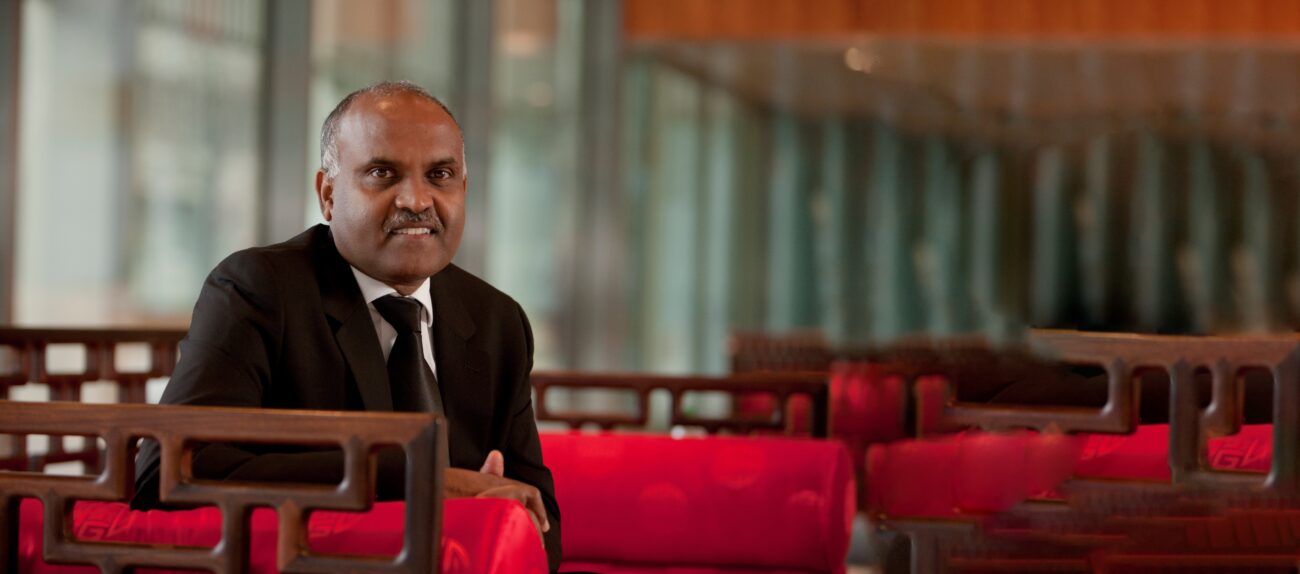Raised with an appreciation for education and living a life that models a good moral compass and taking care of those that report to you, Colin Pillai, co-chair of the World Conference on Pharmacometrics (WCoP) that took place 29 March to 1 April 2022 in Cape Town, is a result of nurture and fierce determination. Inspired by his parents who instilled a passion for further education, Colin has gone on to break barriers but hasn’t forgotten those left behind.
Growing up in Chatsworth, Durban, Colin’s parents were a major influence when it came to pursuing higher education. It was especially from his father’s strong example that Colin pursued his career and managed to reach incredible heights working in the pharmaceutical sector and driving programmes that develop scientific capability in low- and middle-income countries.
Trained as a pharmacist at the University of Durban Westville, Colin pursued a PhD in Clinical Pharmacology and Mathematical Modelling of Drug Effects. He acquired clinical and research experience in hospital and community pharmacy and worked as a consultant with the SA Medical Research Council’s Tuberculosis Research programme, where he ran a unit conducting Phase 1 clinical trials in Durban.
Colin’s life took a turn in 2000 when he was invited to Basel Switzerland as a visiting professor at F. Hoffmann-La Roche, a company that was looking to build up the science of pharmacometrics and establish a group of its own.
He later moved to Novartis and headed up the modelling department of the company. When he left the pharmaceutical industry, Colin set up two social ventures – CP+ Associates based in Switzerland, and Pharmacometrics Africa N PC, a non-profit organization registered in South Africa, whose goal is to build up science in Africaa nd low- and middle-income countries in terms of the whole spectrum of drug discovery and development.
Now based in Switzerland, Colin, keenly aware that his departure from South Africa made him part of the brain drain, has maintained active academic links with numerous institutions in Africa including via formal Honorary Professorships and Board Member status. He has also dedicated a lot of his activities to finding ways to mitigate the brain drain and build up science in Africa. Since November 2017, he is a Senior Adviser on capacity development and training programmes for global health to the Bill & Melinda Gates Foundation.

Can you explain how the association with the South Africa National Convention Bureau (SANCB) came about?
The association was a result of conversations with Lerisha Mudallar from Wesgro (Western Cape, Tourism, Trade and Investment Promotion Agency), a partner to SANCB. Though the partnership came about after having already won the bid to run the World Conference on
Pharmacometrics, the SANCB gave tremendous assistance with administrative issues such as Visa application processing. Though not a direct remit of SANCB, they were able to explain the process and worked with local home affairs authorities to facilitate the process in an efficient way. The SANCB also gave valuable yet impartial advice on preferred suppliers and vendors for organisers to make informed decisions. As scientists and not event organizers, that type of advice was extremely helpful to WCoP.
How do you see South Africa as a business events destination?
The continent is a major selling point. As a tourist destination, it is incredible and anything more than that is just the cherry on the top. As a country, South Africa tends to have a world-class infrastructure when it comes to international conferences, and this was highlighted during the hosting of WCoP. It also boasts amazing local service providers that have the skill and expertise to handle the demands and challenges of the international organizer and community.
Organizing WCoP in Cape Town has actually showcased Africa as a destination for scientific innovation. I am excited about the potential for local job creation in healthcare and data sciences research via collaborations with the international community.
To what extent are business events important for the health sector?
Business events such as WCoP are important, especially in a nascent, new field like Pharmacometrics. They bring together delegates to build the next generation of scientists, so it aids in capacity and capability development. This ranges from teaching and training during preconference workshops and getting young scientists to share their knowledge and initiatives. It is also a setting where they can conduct internal benchmarking to see where they fit relative to where they should be going. Conferences are also vital for young scientists to identify peers and potential collaborators, locally, regionally, and internationally.
For the older career scientist, events such as these allow of the two. This gives people the best of both worlds them to see how they can expand their network or produce pieces of work that can be more impactful. For the companies/organizations that sponsor the events, conferences are vital to showcase what they do so they can get exposure and continue to do more of it. The sector as a whole also benefits because these business events get pharmaceuticals, regulatory bodies, and academia – bodies that might not usually engage – in an environment that helps them break down barriers and potentially collaborate.
In that regard, face-to-face conferences seem to ‘work’ better…
In 2021, WCoP was held as a hybrid event, and that was a resounding success. In a virtual setting, people can engage either on video or chat, and if they decide to type a question, they tend to put a bit more thought into it, which is a huge positive. Added to this when a delegate asks a question in a virtual setting it allows them to get more contributions and answers not just from the speaker but from other delegates who can respond in the chat.
Having said that, face-to-face settings are a better environment to have tough conversations which are hard to do virtually. When engaging face-to-face, you can have a tough conversation, but still, have the option to meet socially thereafter to clear the air which is not always possible virtually.
Looking to the future, hybrid is the way to go. A business event that is not 100% face to face or 100% virtual but a combination in a way that is seamless and both groups of people have a rich and robust experience as either alone. The world is already talking about holograms and being able to present using those, so the whole hybrid world is changing very rapidly. There will always be a place for virtual and a place for face-to-face. The trick is how to bring them together seamlessly.
More information on South Africa as a conference destination on www.southafrica.net/us/en/business
